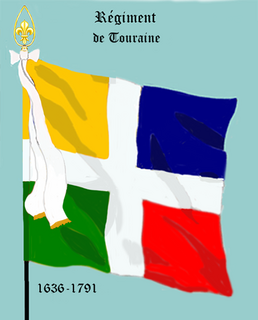 W
WThe New South Wales Marine Corps (1786–1792) was an ad hoc volunteer unit that the British Royal Navy created to guard the convicts aboard the First Fleet to Australia, and to preserve "subordination and regularity" in the penal colony in New South Wales.
 W
WThe Régiment d'Agenois was a French infantry regiment created under the Ancien Régime in 1595. It participated in the American War of Independence.
 W
WThe Régiment Artois was a French Army regiment active during the late 17th century and 18th century. It is principally known for its role in the Seven Years' War, when it served in the North American theatre.
 W
WThe Régiment d'Auvergne was a regiment of the French army during the ancien régime.1597 : the creation of the Régiment du Bourg de Lespinasse. 1635 : the régiment becomes the Régiment d'Auvergne. From 1616 to 1635, the new regiments become permanent. 1776 : The 2nd and 4th battalions become the Régiment de Gâtinais
 W
WThe Régiment de Béarn was a French Army regiment active in the 18th century. It is principally known for its role in the Seven Years' War, when it served in the North American theatre.
 W
WThe 3rd Dragoon Regiment was a cavalry regiment in the French Army, it was active in various forms from 1649 to 1997.
 W
WThe Régiment Artois was a French Army regiment active during the late 17th century and 18th century. It is principally known for its role in the Seven Years' War, when it served in the North American theatre.
 W
WThe 1st Cuirassier Regiment was the oldest armoured regiment in the French Army, until it was amalgamated with 11th Cuirassiers Regiment. Today its traditions are carried on by the 1st Cuirassier Squadrons Group of the 1st-11th Cuirassier Regiment.
 W
WThe 3rd Cuirassier Regiment was a cavalry regiment of the French Army, later reequipped as an armored regiment.
 W
WThe Régiment de Guyenne was a French Army infantry regiment in the 18th century. It is principally known for its role in the Seven Years' War, when it served in the North American theatre.
The 1st Artillery Regiment is a regiment of artillery in the French Army tracing its modern history to 1791 when the Régiment de La Fére was re-organised into the 1st Artillery Regiment after the French Revolution.
 W
WThe Régiment de la Reine was a French Army infantry regiment active in the 17th and 18th centuries. It is principally known for its role in the Seven Years' War, when it served in the North American theatre.
 W
WThe Régiment de Languedoc was a French Army regiment active in the 18th century. It is principally known for its role in the Seven Years' War, when it served in the North American theatre.
 W
WThe Régiment de Normandie was created in 1616 from different military groups in Normandy by the Maréchal of France Concini, marquis d'Ancre and the favorite of the Queen Marie de Médicis.
 W
WThe Régiment de Soissonnais has a long history in the French armed forces. They fought at the Battle of Fontenoy 1745 and the Battle of Yorktown (1781) during the American Revolution.
 W
WFounded in 1625, the Régiment de Touraine was a French infantry regiment raised in the province of Touraine.
 W
WThe Royal Irish Regiment of Foot Guards, or "His Majesty’s Regiment of Guards in Ireland", was a regiment of foot guards first raised in 1662 for service in Ireland. Part of the Royal Irish Army of Charles II, it was initially garrisoned around Dublin.
 W
WThe 6th Regiment of Dragoons is a French regiment of cavalry formed under the old regime, and dissolved in 1992.
 W
WThe 5th Hussar Regiment was a French Hussar regiment.
 W
WThe 6th Cuirassier Regiment was an ancient French cavalry regiment. It has since merged with the 12th Cuirassier Regiment to form the 6th-12th Cuirassier Regiment.
 W
WThe Régiment de la Sarre was a French Army regiment active in the 18th century. It is principally known for its role in the Seven Years' War, when it served in the North American theatre.
 W
WThe Régiment Royal was a French Army regiment that had been enlarged by renaming and uniting older regiments. At the time, the régiment de l'Altesse and the régiment Royal became one. The regiment Royal was first started 1656 by the Duke d'Arpajon.
 W
WThe Régiment Royal-Suédois was a foreign infantry regiment in the Royal French Army during the Ancien Régime. It was created in 1690 from Swedish prisoners taken during the Battle of Fleurus. The regiment eventually acquired the privilege of being called a Royal regiment.
 W
WThe 43rd Infantry Regiment was a French infantry regiment which dated back to the creation in 1638 of the Régiment Royal des Vaisseaux - one of the regiments of the Maison militaire du roi de France created to serve on boats and in the colonies: all such regiments were, in 1791, given a number in the line-infantry order of battle meaning that they could be considered historically as the "ancestors" of the naval infantry regiments.
 W
WThe Royal Irish Regiment of Foot Guards, or "His Majesty’s Regiment of Guards in Ireland", was a regiment of foot guards first raised in 1662 for service in Ireland. Part of the Royal Irish Army of Charles II, it was initially garrisoned around Dublin.